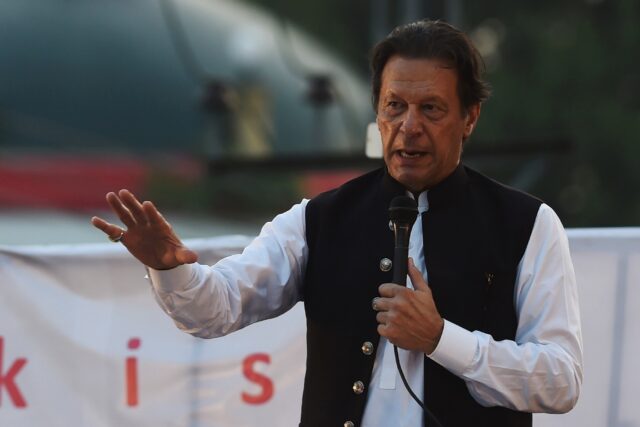Former Pakistan prime minister Imran Khan was disqualified Friday from running for political office for five years after the election commission ruled he misled officials about gifts he received from foreign leaders while in power.
The decision is the latest twist in political wrangling that began even before Khan’s April ouster, and is one of several legal battles being fought by the former international cricket star and his Pakistan Tehreek-e-Insaf (PTI) party.
Dozens of his supporters attacked vehicles as they left the Election Commission of Pakistan (ECP) headquarters following the ruling, and police detained a party security guard after he fired a shot into the ground.
At least a dozen small protests erupted across the country, and police fired tear gas to disperse PTI supporters trying to block traffic in the capital, Islamabad.
before the end of the month.
Pakistan’s courts are often used to tie up lawmakers in lengthy proceedings that rights monitors criticise for stifling political opposition, but the commission’s involvement in this case stems from the obligation of elected officials to declare all their assets.
The case centres on a government department known as “Toshakhana”, which during the Mughal era referred to the “treasure houses” kept by the sub-continent’s princely rulers to store and display gifts lavished on them.
Government officials must declare all gifts, but are allowed to keep those below a certain value.
More expensive items must go to Toshakhana, but in some cases the recipient can buy them at around 50 percent of their value — a discount Khan raised from 20 percent while in office.
Pakistani newspapers have for months carried lurid stories alleging Khan and his wife received lavish gifts worth millions during trips abroad — including luxury watches, jewellery, designer handbags and perfumes.
Khan has said he did not register some gifts on national security grounds, but in a written submission admitted buying items worth nearly 22 million rupees ($100,000), and later selling them for more than twice that amount.
Political disruptor
Unless overturned by the courts, Khan’s ban will stymie one of his key tactics to disrupt the country’s political process as he presses for a general election ahead of the one scheduled for October next year.
All PTI lawmakers have quit the National Assembly — parliament’s lower house — forcing a series of by-elections.
In most of them so far, Khan has been his party’s only candidate.
This week he won six of eight National Assembly seats he stood for in a weekend by-election, a vote he called a referendum on his popularity.
Individuals can stand in multiple constituencies in Pakistani elections and choose which to forfeit if they win more than one.
Khan regularly holds rallies drawing tens of thousands of people across the country, giving fiery speeches criticising state institutions — including the powerful military — for allegedly conspiring to topple his government.
Khan’s opponents were delighted by the Election Commission’s ruling.
“He who would spread lies about alleged corruption of his political opponents has been caught red handed,” tweeted Foreign Minister Bilawal Bhutto Zardari.
Legal experts and analysts were more circumspect, however.
“The silver lining for Mr. Khan is that… he hasn’t been disqualified by the apex court so he has a right of appeal,” independent lawyer Osama Malik told AFP.
“This decision will escalate the political tension in the country and the situation will deteriorate,” said analyst Hassan Askari Rizvi.

COMMENTS
Please let us know if you're having issues with commenting.